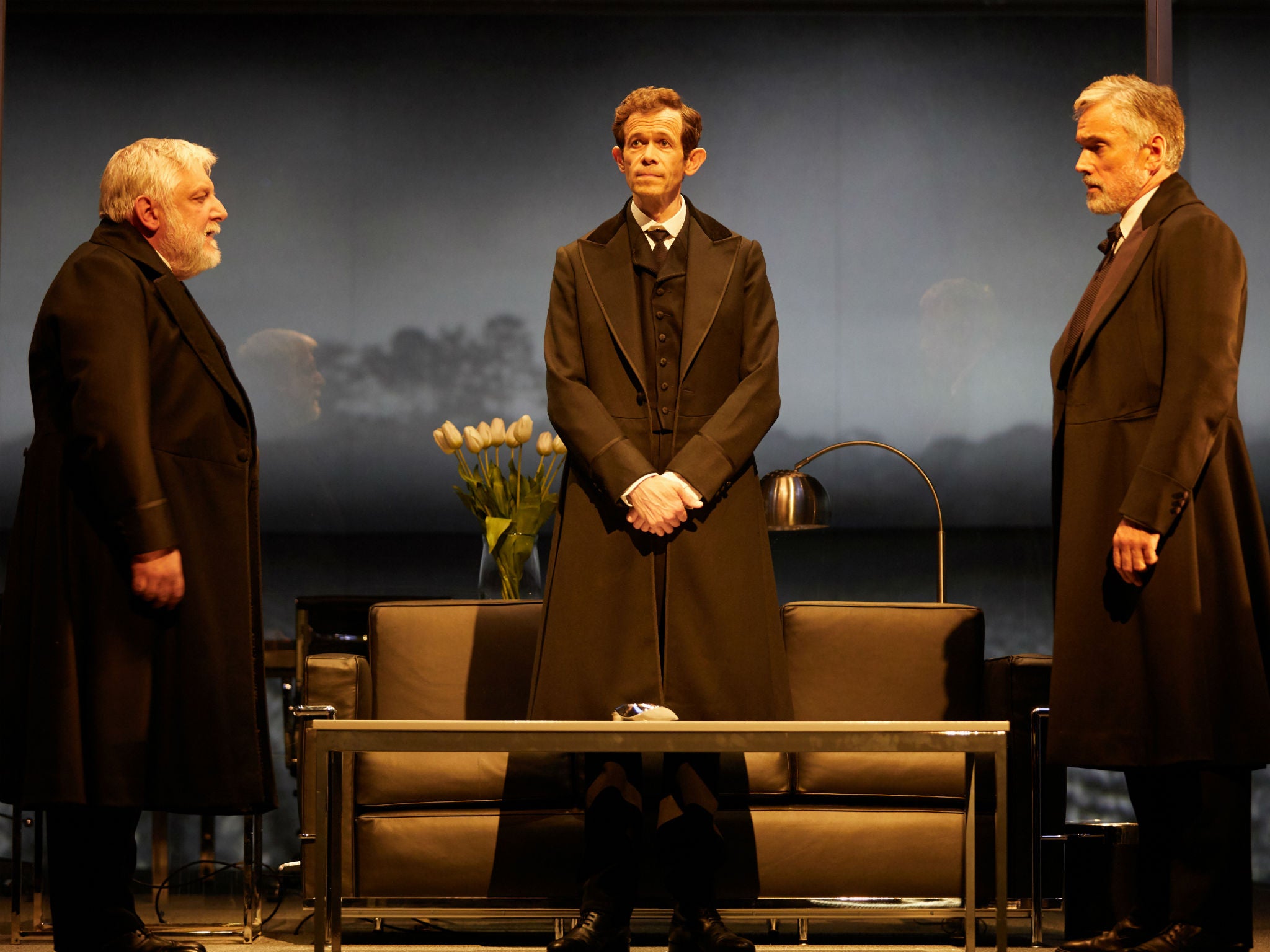The Lehman Trilogy, National Theatre, London, review: A powerful play directed by Sam Mendes with extraordinary elegance
Magnificent performers multitask in this epic story of the Lehman Brothers family business

There has been no shortage of books, movies and documentaries that have raked over the spectacular collapse of Lehman Brothers, that premonitory spasm of the worst financial crash in history. This enthralling play, by the Italian author Stefano Massini, takes the long view.
Distilled by Ben Power from the bulkier version already seen in Europe and directed with a brilliant minimalism by Sam Mendes, it’s an epic that aims to chart the entire hubristic history of American capitalism through the rise and fall of this particular family business.
Simon Russell Beale, Ben Miles and Adam Godley play the founding fraternity – Bavarian Jews who arrive in “the magical musical box called America” in the mid-1840s and set up a modest one-room shop in Montgomery, Alabama, where they sell cloth by the inch to poor folk. Before long, this dedicated trio in their black frock coats are loaning money to the plantations in return for payment in raw cotton which they sell on, at a profit, to New York. They effectively invent the role of “middle man”, a term that Mayer (Godley) proudly relays to the father of his future wife. They invest in coffee and railways and thrive to the point where their core commodity is money itself.
Mendes’s stroke of genius is to present the piece as a three-hander and to set the entire proceedings amid the bagged-up debris of the ruined modern bank (a rotating see-through cube in Es Devlin’s superb design, with a cyclorama behind it for black-and-white video projections of the Atlantic Ocean, cotton fields, skyscrapers and stockmarket frenzy).
The piece begins briefly on the fatal day of 15 September 2008 then immediately loops back to 1844 and the arrival on American shores of Henry Lehman (Beale). He is wearing his best shoes that he has been keeping pristine for this event and, at the same time, looks as if he is stepping into the ultimate wreckage of his dreams.
The minimalism is strict and eloquent. The performers evoke everything in this 164-year saga with what is left behind in the office. The cardboard storage boxes, which are a popular synecdoche for this collapse, become podiums, towers of Babel, the columns of the New York Stock Exchange; the upwardly mobile brothers emend their signage by scrawling in marker pen on the transparent wall.
All three performers are magnificent. They narrate their stories and, often very drolly, play the rest of the characters in it, including wives and children. Godley is wonderful – whether semaphoring the dismissiveness-cum-curiosity of a hard-to-get female catch, or dancing himself to death as the chillingly self-brainwashed Bobbie while the stockmarket goes haywire around him.
And Simon Russell Beale is particularly compelling in his portrait of the disturbingly single-minded (and latterly demon-haunted) Philip Lehman in the second generation (“Pure money! Pure adrenaline!”), but can metamorphose, with the tiniest shifts of gesture, into a demure 19th-century Alabama girl, a doddery old rabbi, or a society spouse turned spiteful lush through neglect.
There are no changes of costume. So as the company moves adrift from its origins, it’s as though the frock-coated founders are still there as a spectral measure of how far the family business has evolved into a monster that they could not have envisaged.
The tactic points up the continuities too. There’s a splendid incantatory rhythm to Power’s script that has the repetitions you find in folk tale (“In that moment, a light breeze caressed Philip’s ear...” ) and the pulse of Jewish ritual. But as faith in the magic of capitalism increases and they no longer trade in material objects but only in the words “fabric” or “coal” (“Money is a ghost. Money is numbers. Money is air”), so the Lehman family becomes damagingly cut off from its Jewish roots.
They sit shiva for seven days in mourning of the death of Henry in 1855; for Philip in 1947 it’s three minutes – “How can we close for a period of mourning?”, and no time at all when Bobbie (Godley) dies without heirs in 1969.
Some may regret that The Lehman Trilogy doesn’t give you the lowdown on, say, the subprime mortgage industry or debt-swallowing shadow companies, as David Hare’s The Power of Yes and Lucy Prebble’s Enron managed to do in very different ways. But by setting the collapse of this bank in the context of one of America’s founding myths, it invites you to ponder whether it was part and parcel of the dream that it would become tainted with hubris.
The final strait seems a bit rushed and it’s odd how the slave question is dealt in the sections covering the Civil War. But, in general, this is a powerful, thought-provoking play and Mendes has directed it with extraordinary elegance and penetration.
Until 20 October (nationaltheatre.org.uk)
Subscribe to Independent Premium to bookmark this article
Want to bookmark your favourite articles and stories to read or reference later? Start your Independent Premium subscription today.

Join our commenting forum
Join thought-provoking conversations, follow other Independent readers and see their replies